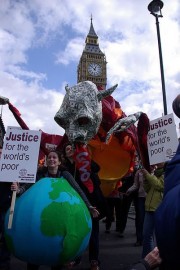
Some of our members wanted to go on the march, so I thought it was worth checking how much of our debate could take place within the framework of the march itself. There is some overlap in the issues being addressed, as I describe below, but also some important gaps.
Put People First: Ensure democratic governance of the economy
1. Compel tax havens to abide by strict international rules.
I think federalists would agree with this. Capital and income flows readily across national borders, and the ability of governments to raise money through taxation is reduced as a result. It is a good thing that there is tax competition between different countries, but tax ought to be paid on specific economic activities and the use of territorial dodges to avoid tax should not be possible. It is one thing to will the ends, though, but another thing to permit the means. What this goal requires is the end of the idea of national sovereignty over taxation. Is that what the marchers really want? It would be nice to think that they did.
2. Insist on fundamental governance reform of the World Bank and International Monetary Fund (IMF).
What do we want? Fundamental governance reform of the World Bank and International Monetary Fund! When do we want it? After a long and complex set of negotiations, that are inseparable from the discussion about tax sovereignty (point 1 above). The background policy paper spells out the kind of reforms that are proposed, and they are consistent with suggestions from federalists in the past.
3. Make all financial institutions, financial products and multinationals transparent and publicly accountable.
There remains the outstanding issue of how to regulate companies that are active in more than one country. It is fairly standard for such companies to seek arbitrage opportunities between the different regulatory frameworks, often encouraging a generalised reduction in regulatory standards as a result. Just because a company operates across national borders is no reason for it to be regulated any less.
Jobs: Decent jobs and public services for all
4. Ensure a massive investment in a green new deal to build a green economy based on decent work and fair pay.
5. Invest in and strengthen public provision of essential services.
6. Work to ensure sufficient emergency funding to all countries that need it, without damaging conditionalities attached.
There’s not a great deal of interest here from a federalist perspective.
Justice: End global poverty and inequality
7. Deliver 0.7% of national income as aid by 2013, deliver aid more effectively and push for the cancellation of all illegitimate and unpayable developing country debts.
8. Ensure that poorer states are allowed to take responsibility for managing their economies, including controlling cross-border capital flows.
9. Stop pushing developing countries to liberalise and deregulate their economies, and do not attempt to rush through a completion of the Doha trade round, a deal that developing countries have rejected several times.
This is a more subtle and nuanced approach to world trade and world markets than normally is contained in documents like this. There is not the flat-out rejection of trade and free markets, rather the suggestion that poor countries might, while they remain poor, need to engage with those markets in a different way from that of the rich countries. It is not impossible that this could be made to work, but the global institutions necessary are not discussed. The Tobin tax on foreign exchange transactions raises its head again: it was a bad idea last time and remains one now.
Climate: Build a Green Economy
10. In addition to the green new deal (recommendation 4), introduce the robust regulatory requirements and financial incentives needed to deliver a green economy.
11. Push for a deal at Copenhagen to agree substantial, verifiable cuts in greenhouse gases, which will limit temperature increases to well below 2°C.
12. Commit to substantial new resource transfer from North to South, additional to Overseas Development Assistance (ODA), to support adaptation and sustainable development in poor countries.
These arguments are essentially the same as the ones above. International goals are desired, but the means of achieving those goals are neglected. There are lots of references to “international rules” and “international standards”, but without any description of how those rules and standards should be set.
For example, in the introduction to the whole paper, we are told that:
“The first step will be a transparent and accountable process for reforming the international financial system. This will require the consultation of all governments, parliaments, trade unions and civil society, with the United Nations (UN) playing a key role.”
It is easy to call for reform. It is harder to say what that reform should look like. Because the march can’t and hasn’t done tried to do that, the federalist discussion of the global institutions must still go ahead.
